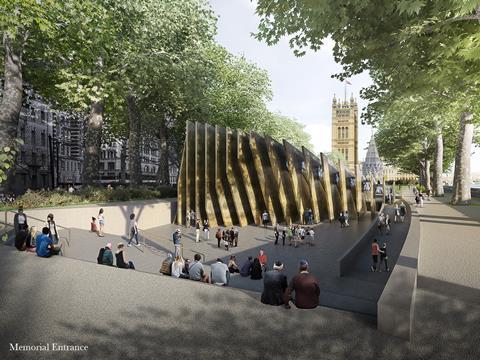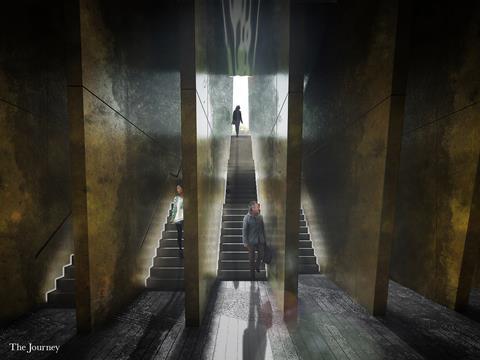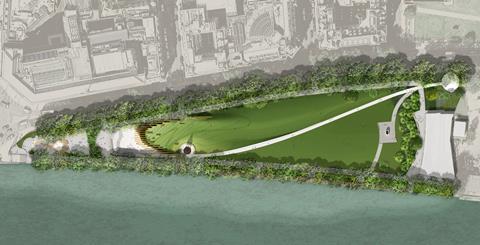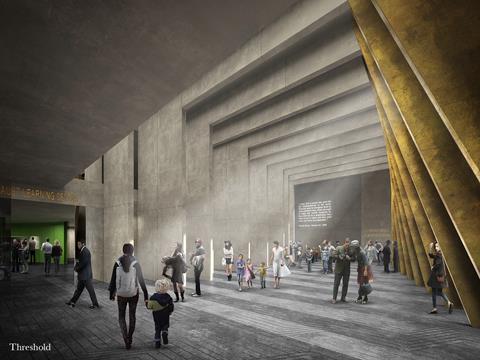Campaigners propose split-site solution as alternative to £103m Adjaye Associates scheme

Opponents of David Adjaye and Ron Arad’s £103m National Holocaust Memorial proposals have said their fight is now entering “crunch time” with new legislation introduced to parliament to overcome legal hurdles to the controversial scheme.
Architect Barbara Weiss and Helen Monger, director of charity the London Historic Parks & Gardens Trust, are calling on MPs to give proper consideration to finding an alternative site for the memorial that will preserve Victoria Tower Gardens, next to the Houses of Parliament.
In April last year the High Court quashed planning permission the Department for Levelling Up, Housing and Communities awarded to the scheme – which is essentially its own project – in 2021, following a public inquiry.
The legal block came after lawyers for the Parks & Gardens Trust successfully argued that the scheme was a breach of a 1900 law prohibiting Victoria Tower Gardens from being used as anything other than a public garden.
Last month the government introduced a new bill to parliament that would disapply the relevant sections of the London County Council (Improvements) Act 1900. The Holocaust Memorial Bill is currently awaiting its second reading in the House of Commons.

Weiss, whose practice is based at Millbank Tower – a short distance from Victoria Tower Gardens – said few public projects had run into as much controversy as the National Holocaust Memorial, and that all problems stemmed from the “extremely questionable” choice of site.
She is calling for a two-site solution that would see a learning centre delivered at College Green, famously used for TV interviews with parlamentarians, and a smaller memorial at Victoria Tower Gardens, which is immediately south of the Houses of Parliament.
“Rather than repealing sensible acts of parliament, now is the time to find a compromise that will satisfy both sides, and to move forward,” she said.
“We propose erecting a memorial of the scale of the Buxton one within the park, locating the learning centre under College Green, where an underground car park already exists.
“This would be a far less expensive option, would preserve all the trees in the park, and have minimal impact on the World Heritage Site – while retaining the demanded proximity to parliament. The lack of sensible negotiations between the parties is outrageous.”

Monger said the government’s current plans were “noble aims pursued in the wrong place” following the cross-party Holocaust Commission’s 2014 recommendation that a “striking” new memorial should be constructed in a “prominent central London location”.
“If the bill is passed, it will result in the effective loss of a public park but sadly, DLUHC has persistently refused to consider alternatives that could achieve the Holocaust Commission’s ambition, which has such widespread support,” she said.
“London Parks & Gardens is determined to defend this and other threatened historic landscapes for the benefit of future generations.”
Explanatory notes accompanying the bill that were produced by DLUHC insist that an “extensive search for suitable sites” was undertaken before Victoria Tower Gardens was recommended to government as the most fitting site for the project.

When the Holocaust Memorial Bill was introduced to parliament, housing secretary Michael Gove said its provisions would remove obstacles to delivering the Adjaye and Arad plans.
“As a nation, it is vital we learn from the past to build a future which is free from prejudice and hatred,” he said.
“This memorial will rightly sit at the heart of Westminster, alongside other great symbols of our democracy, and will act as an inspiration to the whole nation for generations to come.”
He added that the bill was “timely” as Holocaust survivors were becoming older and fewer in number, and that it was “vital” to push ahead with the memorial to the 6 million Jewish people who were murdered in the Second World War.
DLUHC’s explanatory notes for the Holocaust Memorial Bill gave a National Audit Office cost estimate for the project of £102.9m from July last year, but said costs were being reviewed to reflect inflationary pressures and expenses related to the “continuing planning consent process”.
Annual operational costs for the memorial were priced at £6m-£8m.
David Adjaye and Ron Arad won the design competition for the National Holocaust Memorial in autumn 2017.
The pair triumphed over a shortlist that included John McAslan, Foster & Partners, Studio Libeskind, Zaha Hadid Architects and Caruso St John, Allied Works, David Morley and Lahdelma & Mahlamäki Architects.
At the time, the budget for the memorial was £50m.
















No comments yet